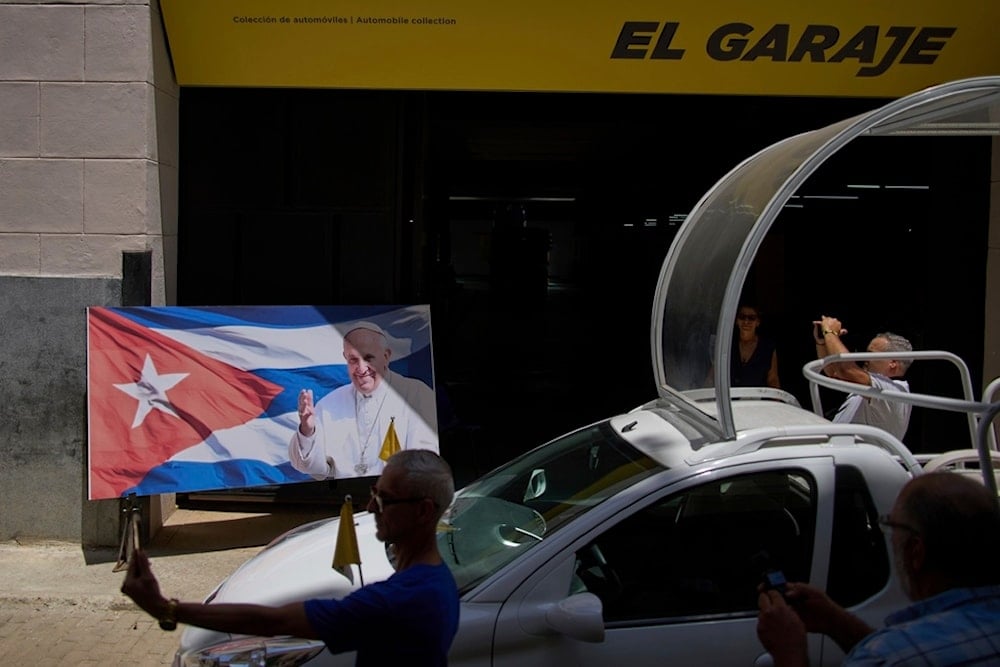Popemobile transformed into mobile clinic for Gaza's children
The mobile clinic will work to deliver life-saving care to Gaza's children, honoring Pope Francis’ final wish amid ongoing conflict.
-

People take photos by a photo of Pope Francis at the entrance to the car museum exhibiting one of the Popemobiles he used during his visit to Cuba in Havana, Tuesday, April 22, 2025 (AP)
The 'popemobile' once used by Pope Francis during his 2014 visit to Beit Lahm is being repurposed as a mobile medical unit to serve children in the Gaza Strip. The initiative, coordinated by the humanitarian group Caritas, comes in response to what the Vatican says is the pope's "final wish for the children of Gaza" before his passing last month.
Currently stationed in Beit Lahm, the vehicle is being outfitted with essential supplies to operate in active conflict zones. According to Caritas, "There'll be rapid tests, suture kits, syringes, oxygen supplies, vaccines and a small fridge for storing medicines." The clinic will be staffed by a team of medical professionals and accompanied by a dedicated driver.
The mobile unit is ready for deployment pending the opening of a humanitarian corridor into Gaza. Peter Brune, Secretary General of Caritas Sweden, expressed the urgency of the mission: "With the vehicle, we will be able to reach children who today have no access to health care – children who are injured and malnourished." He also noted that logistical work is ongoing to ensure the vehicle can withstand potential explosions. "It's not just a vehicle, it's a message that the world has not forgotten about the children in Gaza," he said.
Humane legacy
Since the war began in October 2023, over 15,000 children have died and nearly one million have been displaced, according to UNICEF. The ongoing blockade by "Israel" has prevented aid from entering the Strip for more than two months. The UN children's agency said the situation has left "families struggling to survive" as essentials like food, water, and medicine dwindle to critical levels.
Throughout his papacy, Francis repeatedly condemned the humanitarian crisis in Gaza. In his final Easter address, he urged all sides to accept a ceasefire and spoke openly about the suffering of Palestinians. He also made personal efforts to stay in touch with Gaza's Christian community, reportedly calling parishioners nightly during the conflict. In one of his more controversial statements, he suggested that the global community should examine whether "Israel's" military actions might meet the threshold of genocide.
The popemobile itself has long symbolized the pontiff's direct engagement with the public. While earlier models were bulletproof following the 1981 assassination attempt on Pope John Paul II, Francis opted for a more open design. In a 2014 interview with Spanish media, he said he disliked the enclosed models, referring to them as resembling a "sardine can."
"Israel's" war on Gaza has so far resulted in at least 52,243 Palestinian deaths, and the numbers keep mounting amid the ongoing blockade, according to Gaza's health ministry. On Monday, "Israel's" security cabinet reportedly backed a plan to restart humanitarian aid deliveries via private firms. However, the UN and other relief agencies have criticized the proposal, arguing it violates humanitarian principles and declaring they will not take part.
Read more: 'Israel' deletes post with condolences on death of Pope Francis

 3 Min Read
3 Min Read








